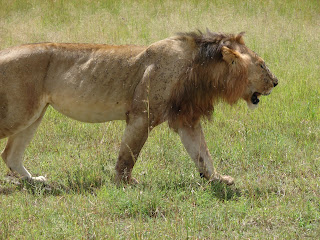In the heart of Africa, in Kenya, it is best not to mess with the monkeys.
Let me explain.
We (Bob, Chuck and I) were lucky enough to be staying at the very exotic Oltukai Lodge in Kenya at the foot of Mt. Kilimanjaro when we were on safari. Yes, that Mt. Kilimanjaro, the mountain that Hemingway wrote about, the highest peak in Kenya, the snow-covered peak that’s often covered by clouds until the mid-part of the day. From our cabin you could see the mountain if you were willing to walk a bit toward Amboseli National Park where the wild animals roam free. It is quite something to look out into the distance and know that the mountain you are seeing is Kilimanjaro. At that moment you know you are in a very special place.
 |
| Oltukai Lodge in Kenya |
 |
| Snow-capped Mt. Kilimanjaro |
And we were.
The other clue was that the lodge we were staying out resembled the lodge we’d stayed at in Disney World in Florida when we’d booked a week at Animal Kingdom. I suspected that someone from the Disney Franchise had come to Oltukai Lodge--which is the real deal--mosied around, taken some photos and made some notes, ie. this is what a real safari lodge looks like and then raced back to Florida and designed the lodge at Animal Kingdom.
 |
| Interior view of the lodge |
At Oltukai, you have the Lodge and the grounds, but outside the fence is Amboseli National Park much like Animal Kingdom which features the lodge and grounds and then a savannah where animals roam and are fed for the entertainment of the guests.
 |
| the savannah of Amboseli National Park - elephants |
One detail is missing, however, in Animal Kingdom--the free roaming monkeys that pepper the grounds at Oltukai Lodge. It is one thing to be in a safari vehicle, barrelling along a dirt road on the savannah in a preserve and see elephants, giraffes, zebras, hyenas, cheetahs, lions, wildebeests, cape buffalos, and over 400 species of birds. It is quite another to be on the grounds of the lodge and bump into a monkey.
 |
| Amboseli National Park has over 400 species of bird |
 |
| Monkeys roam free on the grounds of the lodge |
That’s what happened to Chuck. It was mid-morning, after breakfast. Mt. Kilimanjaro was still covered in clouds. Chuck was lounging on a chair on the front porch of our cabin, relaxing, when a baby monkey skeddadled around the corner into view and stopped and stared at Chuck.
Chuck lifted his head and stared back but didn’t move.
 |
| Our cabin with front porch while staying at the Lodge |
The baby monkey, cute as can be, moved closer, clearly curious. Perhaps, baby monkey had never seen a cat before. Chuck, also curious, had never seen a monkey before.
The baby monkey moved even closer and now just a few feet separated them, but neither seemed threatened by the other. I was intrigued now. What would happen when were so close their noses touched?
It happened within seconds. The baby monkey reached out to touch Chuck’s whiskers. Chuck sniffed the baby monkey, then turned sideways as the baby latched onto Chuck’s belly. Chuck began to waddle away, toward the porch just as another monkey appeared . . . and it didn’t take a genius to figure out who it was -- Mama Monkey.
Within seconds she sized up the situation and came to the obvious wrong conclusion because she let out a squeal that sounded like she was being murdered and charged toward Chuck.
Kidnapping! Rescue!
I was frozen to the spot, mesmerized. If Mama thought Chuck was kidnapping her baby . . .
Chuck glanced over and before he could do anything, that cute baby monkey jumped down and ran toward Mama.
Mama stopped and scooped up baby. Immediately she calmed down.
 |
| Baby monkey safe within Mama Monkey's arms |
No more drama. Chuck came back up on the porch and laid down. “You are one lucky cat, Chuck,” I whispered, keeping one eye on Mama and one eye on the baby. Wowee!
MY PARANORMAL ROMANCE, WILD POINT ISLAND, IS AVAILABLE IN PAPERBACK AND EBOOK FROM AMAZON.COM AND BARNESANDNOBLE.COM.
READER REVIEWS ON AMAZON: 4.8 STARS

























